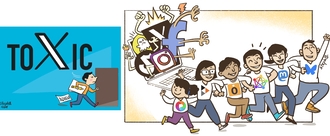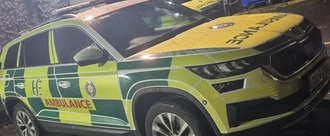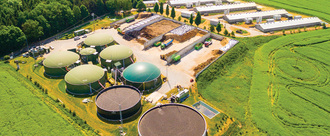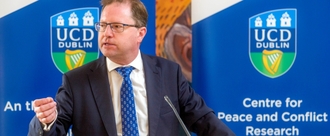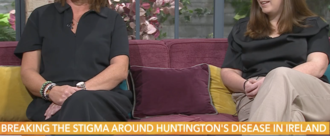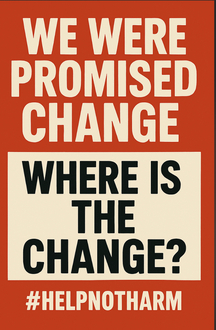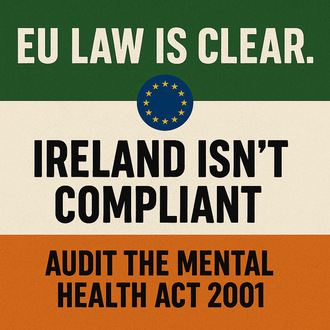- Featured
- Animal Rights
- Anti-racism
- Arts & Culture
- Children
- Climate
- Corporate accountability
- Crime
- Disability rights
- Economic
- Education
- Environment
- Food and Sustainable Production
- Gender Equality
- Governance and Transparency
- Health
- Housing
- LGBT Rights
- Mental health
- Northern Ireland
- Planning
- Privacy and Data Protection
- Rural Inequality
- Social Justice
- Trade
- Transport and Infrastructure
- Workers' Rights
- More
-
Take X icons off websites and emails ! And replace with Mastodon icons !Why leave and de-platform toxic and lock-in social media (such as X, Instagram, Snapchat, Tiktok) ? Black Box Algorithms: Lock-in platforms aim to show you more content that their owners like Elon Musk, Mark Zuckerberg and their paymasters want you to see, and less content that you want to see…. https://xodus.online/why#algorithms Rise of the far-right: Toxic platforms promote hate, the far-right, and interfere in elections…. https://xodus.online/why#democracy Disinformation: Toxic platforms do not support adequate fact-checking or moderation…. https://xodus.online/why#disinformation Over-consumption: Advertising-profit-platforms promote consumption patterns which are unhealthy for people and planet…. https://xodus.online/why#consumerism131 of 200 SignaturesCreated by Elaine Baker
-
Restore 24/7 Rapid Response Vehicle in County RoscommonThe Rapid Response Vehicle (RRV) saves lives. An Advanced Paramedic should be on the RRV 24/7 - that was the promise made to the people of Roscommon. They are the ONLY personnel in the National Ambulance Service who can provide advanced life support. We need this critical service.3,220 of 4,000 SignaturesCreated by Claire Kerrane

-
Regularisation of the working asylum seekers for more than 3 years in IrelandMany asylum seekers are already part of our communities. They work in essential sectors, pay taxes, support local businesses, and contribute to Irish society, yet they remain in long-term uncertainty about their future. Regularising long-term contributors would strengthen communities, help address labour shortages, increase tax compliance, and reflect Ireland’s values of fairness, dignity, and compassion. These individuals are our co-workers and neighbours, and they deserve the chance to fully integrate and build stable lives in the country they now call home.23 of 100 SignaturesCreated by Ahmed Mayouf
-
Bring in National Safety, Odour, and Environmental Regulations for Biogas AD Plants in IrelandAnaerobic digestion (AD) and biogas can play a positive role in Ireland’s renewable energy transition — but only when properly regulated. Unfortunately, Ireland currently lacks the basic national standards that other EU countries already require. As a result, AD plants are being proposed far too close to homes, private wells, schools, farms, rivers, Natura sites, and even busy motorways. Local authorities have no consistent guidance, and communities are left exposed to unnecessary health, safety and environmental risks. The Problem 1. No minimum setback distances Ireland has no national separation distances between AD plants and: • homes • drinking-water wells • schools • roads and motorways • protected habitats Other countries use 300–500m as standard — Ireland uses none. 2. No national odour standards Odour from digesters, waste reception, and digestate tanks can travel long distances depending on wind and elevation. Ireland has: • no odour regulations • no odour-modelling requirement • no mandatory odour-abatement technology Communities near existing plants frequently report persistent nuisance. 3. Risks to private wells and groundwater Many homes rely on private wells. AD sites store large quantities of slurry, digestate, industrial food waste, and fats/oils/grease. A spill or leak can contaminate groundwater. Ireland has no minimum distance from wells and no hydrological protection rules. 4. Proximity to motorways and road-safety concerns AD plants store methane, biogas and large waste volumes. Without national TII guidance, sites can be placed only metres from national roads and motorways — raising concerns about: • tanker traffic • vehicle fires • collision risks • gas leaks • spill containment This is a major planning gap. 5. Industrial waste accepted with little oversight Many AD plants take: • offal • dairy processing waste • food-industry by-products • fats, oils, grease (FOG) • expired packaged food These greatly increase odour, emissions, and risk. Ireland has no national limits, no composition standards, and weak monitoring. WHAT WE ARE ASKING FOR We call on the Minister for the Environment, the EPA, TII, and the Department of Housing to create national AD biogas regulations, including: ✔️ Minimum 500m setback distance From homes, schools, and private wells, unless independent scientific assessment proves otherwise. ✔️ National odour limits With mandatory odour-modelling, abatement systems, and compliance monitoring. ✔️ Groundwater and well protection Hydrological assessments, protected zones, and strict containment standards. ✔️ Rules for industrial waste Clear permitted-waste lists, composition limits, and independent monitoring. ✔️ Road-safety guidelines National TII rules for AD plants near major roads and motorways. ✔️ A full national AD planning framework Like those already existing for windfarms, quarries, and intensive agriculture — ensuring safety, consistency, and transparency. ⸻ WHY THIS MATTERS Ireland needs renewable energy — but we also need safe, responsible, and properly regulated development. Right now, communities across Ireland are being forced to fight these issues one planning application at a time, without the protection of national rules. A clear regulatory framework would protect: • public health • groundwater and private wells • road safety • rural communities • local wildlife and habitats • quality of life We urgently need the Government to act. CALL TO ACTION Sign now to demand strong national regulations for biogas AD plants — to keep our homes, water, and communities safe.361 of 400 SignaturesCreated by Adrian Darcy
-
Coffee machine & Microwave Setu nursing buildingCost of living68 of 100 SignaturesCreated by Oscar Stakem
-
Feed a Student. Build a LeaderSome students don’t need more motivation. They just need a meal. Right now across Ireland, too many students are studying hungry, skipping meals to pay rent or travel to class. Hunger isn’t just physical. It drains focus, energy, and hope. When we feed students, we’re not just helping them survive college. We’re helping them show up fully, to learn, lead, and become who they’re meant to be. This is why we’re building Crave Christi Student Sponsorship, to make sure no student is left behind because of an empty plate. Join us in turning compassion into action. Together, we can make student hunger impossible to ignore. Because hunger shouldn’t be part of the college experience. Not here. Not now.84 of 100 SignaturesCreated by Crave Christi

-
Every Child Deserves the Healing Power of Play TherapyWho is affected? Across Ireland, thousands of children are struggling with anxiety, trauma, and emotional challenges. Too many are being offered short pilot programmes, which simply cannot meet their needs. Play Therapy gives children the time, space, and safety to express themselves, build trust, and heal — but it requires a minimum of 12–15 weeks to be truly effective. What is at stake? When children don’t receive consistent support, their emotional distress often shows up as difficulties with concentration, behaviour, and learning. This affects not only their mental health but also their confidence and academic progress. Without sustained Play Therapy, many children fall further behind, and families and teachers are left without the help they need. Why now? We are calling on the Irish Government — including the Department of Education, the HSE, and TUSLA — to fund proper school-based contracts employing Play Therapists for 20–25 hours per week. This model reflects safe professional practice and ensures children can receive the minimum 12–15 weeks of support they need. The time to act is now — our children deserve lasting care, not short-term pilots.516 of 600 SignaturesCreated by Alanna Sarah Kearney
-
Huntington's Disease families in Ireland - Please sign to support and end the neglectWhy This Matters — To Everyone Huntington’s disease families in Ireland have been promised and then denied basic care and support. We are a small, relatively rich country and our healthcare system is failing those who need it as well as those who work in it. Sign this petition to support families : • Proper Huntingtons Disease care through specialist multi-disciplinary teams (like Scotland has - same population but a specialist team in all 7 major cities) • A health system ready for advanced therapies like the Uniqure trial making the news • Leadership that keeps its promises Because a health service that fails us today will fail our tomorrows.1,072 of 2,000 SignaturesCreated by Amanda Spencer
-
Kelvins amendmentMy son Kelvin was in services from the age of five (CAMHS), he was not diagnosed until he was 13 yrs when he advised me, his mother he was suicidal.. kelvin then got a diagnosis privately at the age of 13 of Asperger’s, generalised anxiety, sensory processing disorder and dyspraxia. CAMHS then only recognised his diagnosis and gave us a one line report. Because dual diagnosis is not recognised. Kelvin then spent the next 13 years trying to access services, every door was shut. In one year alone kelvin and myself presented at Naas A&E to try get treatment for Kelvin. We attended up there 60 times, only to be refused time and time again. On one occasion myself & Kelvin were asked to leave by security and escorted to the door. Security verbally abused us. Kelvin felt totally defeated again. This is harrowing for anybody experiencing mental health difficulties. Kelvin tried to end his life a number of times. Kelvin eventually ended his life to suicide in a hotel room alone in May 2025. I his mother, believes Kelvin ended his life to end his pain. Kelvin said to me numerous times. I cannot live with the daily symptoms of high anxiety, visual distortions and paranoia.5,372 of 6,000 SignaturesCreated by Noeleen Eustace

-
Cannabis regulation and expansion of the MCAP program NOW!It has been 21 months since the citizens assembly voted to change drug laws here in Ireland. It has been 9 months since a drugs committee recommended cannabis was decriminalised and the Medical Cannabis Program was expanded. It has been 8 months since the Taoiseach, Micheál Martin Launched his election manifesto promising to decriminalise Cannabis. So where are the changes? As of 29th of July 2025 the Irish Government has made HHC Illegal, this is NOT a health-led policy or something that is going to stop young people consuming substances. In reality and what the government has done is give organised crime gangs another new way to make more profits while putting more lives at risk, are you happy with that? We need to demand change & we need change now! Please join me in pushing for changes in these laws like we were promised and help change peoples lives for the better & not harm them even more.252 of 300 SignaturesCreated by Ashley Martin (Guerriero)
-
Life festivalFor the vibes4 of 100 SignaturesCreated by Bob Garry
-
UPDATE MENTAL HEALTH ACT 2001Why is it important? Because none of us are safe under a mental health system that’s stuck in 2001. The Mental Health Act 2001 still allows forced treatment, restraint, and seclusion—even though these practices are now widely recognised as harmful, especially to neurodivergent people (like those with autism, ADHD, or trauma-related conditions). It treats emotional overwhelm as illness. It punishes difference as danger. This law was written before most people had smartphones. Before we had language for sensory overload, neurodivergence, or digital expression. It’s outdated, invasive, and not trauma-informed—and it puts thousands of people at risk every year. Why should others join? Because you don’t have to be in crisis to care. This campaign is about protecting our freedom, dignity, and human rights. It’s about making sure no one is silenced, secluded, or forcibly medicated for being misunderstood. If you’ve ever: • Had your feelings dismissed as “too much” • Been misdiagnosed • Been afraid to seek help because the system might punish you Then this campaign is for you. We need to audit the Mental Health Act 2001—and bring Ireland in line with modern science and EU human rights law. Join us. Share. Demand better. ACTIVATE. AGITATE. AMPLIFY!58 of 100 SignaturesCreated by Fiona Anon

